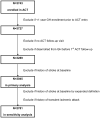Atrial fibrillation and risk of dementia: a prospective cohort study
- PMID: 21806558
- PMCID: PMC3289545
- DOI: 10.1111/j.1532-5415.2011.03508.x
Atrial fibrillation and risk of dementia: a prospective cohort study
Abstract
Objectives: To determine whether atrial fibrillation (AF) is associated with risk of incident dementia or Alzheimer's disease (AD), beyond its effect on stroke.
Design: Prospective cohort study.
Setting: An integrated healthcare delivery system.
Participants: A population-based sample of 3,045 community-dwelling adults aged 65 and older without dementia or clinical stroke followed from 1994 to 2008.
Measurements: AF was identified from health plan electronic data using International Classification of Diseases, Ninth Revision, codes from inpatient and outpatient encounters. Covariates came from self-report, study measures, and health plan data. Participants were screened every 2 years using the Cognitive Abilities Screening Instrument (range 0-100), with detailed neuropsychological and clinical assessment of those scoring less than 86. A multidisciplinary consensus committee determined diagnoses of all-cause dementia and possible or probable AD using standard research criteria.
Results: AF was present in 132 (4.3%) participants at baseline and was diagnosed in 370 (12.2%) more over a mean of 6.8 years of follow-up; 572 participants (18.8%) developed dementia (449 with AD). The adjusted hazard ratio associated with AF was 1.38 (95% confidence interval (CI)=1.10-1.73) for all-cause dementia and 1.50 (95% CI=1.16-1.94) for possible or probable AD. Results were similar for participants with and without clinically recognized stroke during follow-up and in sensitivity analyses examining only probable AD.
Conclusion: AF is associated with higher risk of developing AD and dementia. Future studies should examine whether specific treatments, including optimal anticoagulation, can decrease this risk.
© 2011, Copyright the Authors. Journal compilation © 2011, The American Geriatrics Society.
Conflict of interest statement
Figures
References
-
- Federal Interagency Forum on Aging-Related Statistics. [Accessed April 6, 2011];Population, Indicator 1. Available at: http://www.agingstats.gov/agingstatsdotnet/Main_Site/Data/2008_Documents....
-
- Kinsella K, He W. US Census Bureau, International Population Reports. Washington, DC: U.S. Census Bureau; 2009. An Aging World: 2008.
-
- Alzheimer's Association. Alzheimer's Disease Facts and Figures. [Accessed April 6, 2011]; Available at http://www.alz.org/documents_custom/report_alzfactsfigures2010.pdf.
-
- Ott A, Breteler MM, de Bruyne MC, et al. Atrial fibrillation and dementia in a population-based study. The Rotterdam Study. Stroke. 1997;28:316–321. - PubMed
-
- Kilander L, Andren B, Nyman H, et al. Atrial fibrillation is an independent determinant of low cognitive function: A cross-sectional study in elderly men. Stroke. 1998;29:1816–1820. - PubMed
Publication types
MeSH terms
Grants and funding
LinkOut - more resources
Full Text Sources
Medical


